Community frequently asked questions

1. How many people need to be in a group?
Since Self-Development of People seeks to partner with communities, it is unusual for a group of less than ten people to receive funding, although there is no specific number of people required to form a group.
2. When should a project application be submitted?
To allow adequate time for reviewing and processing, groups are encouraged to submit their applications as soon as possible. Applications are accepted year round and funding decisions are made in January, May and September.
3. Is there an application deadline?
There is no application deadline at the National level. However, groups applying for a grant at the Mid Council level will need to contact the appropriate Mid Council directly. To find out if there is a Mid Council SDOP Committee in your area, please call the national SDOP office: toll free English at (800) 728-7228, x5782, toll free Spanish at (800) 728-7228, x5790. Please also visit the webpage on Mid Council SDOP Committees.
4. How should a project application be submitted in order to be considered for possible funding?
Submitting an Application at the National Level
A group may apply for funding by submitting an application at the Mid Council level (i.e. Presbytery or Synod), at the National level or at all three (Presbytery, Synod or National) levels simultaneously. Applications may be obtained by calling the National Office at (800) 728-7228, x5782 or downloaded here.
Submitting an Application at the Mid Council level
Groups applying for a grant at the Mid Council level will need to contact the appropriate Mid Council directly. Please call the national SDOP office first at the above number to find out if there is a Mid Council SDOP committee in your area.
5. Does SDOP fund projects led by youth or children?
SDOP funds youth led projects if the youth directly own and control the project. We do not fund children’s projects because the group members need to be old enough to directly own, control and benefit from the project.
6. What if my group submits an application and it is rejected?
We recognize that although there are many excellent project applications, not all of them may be a “fit” with SDOP funding criteria. They may however, meet the funding guidelines of other funders. For this reason, you are welcome and encouraged to view our list of other funders included on this website. If you think your application was unfairly rejected you may appeal the decision.
7. Who can we call for guidance and assistance as we are working on our grant application?
Please contact the SDOP National Office at (800) 728-7228, x5782.
8. Does our group first need to complete the pre application?
If your group chooses, it may fill out a pre application prior to completing the full version of the grant application. If your group submits a pre application, we will review it and discuss with you whether to proceed with filing a full grant application. However your group may choose to complete the full grant application without filling out a pre application.
9. Does our group need to be formally incorporated as a non-profit 501 (c) (3) organization?
No, 501 (c) (3) status is not a requirement to submit a grant application with Self-Development of People. Self-Development of People works with both groups that do not have 501 (c) (3) status as well as those that do.
10. How long does the review/application processing take?
It is possible that it could take anywhere from three to six months.
11. Does SDOP fund individuals starting a private entrepreneurial business?
SDOP does NOT fund private entrepreneurial start up businesses, for example, one or two individuals wishing to start a house cleaning business. SDOP, however, is interested in partnering with low-income groups that will enhance community economic development. Community economic development involves building communities at the local level and may include for example, developing cooperatives. A cooperative is a group/organization owned by and operated for the benefit of those using its services and involves: equally shared decision making, equally shared revenue, equally shared expenses and investments and equally shared responsibility. Groups will need to meet SDOP funding criteria. Community economic development involves empowering groups of people by enabling them to effect change in their own communities.

